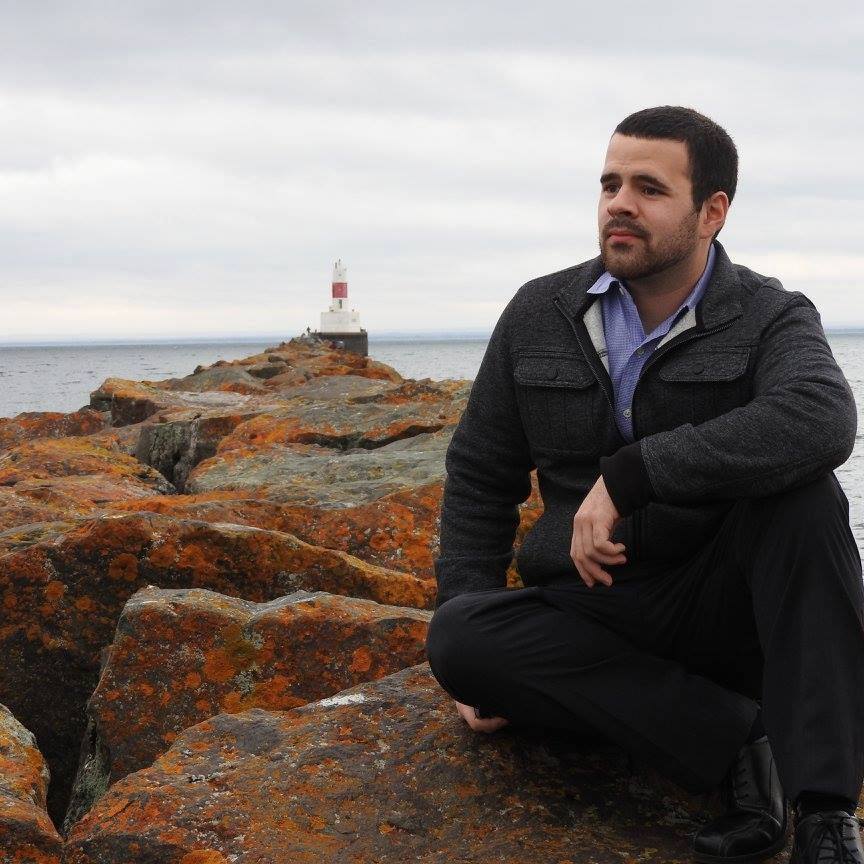 Curtis A. Deeter is a writer of fantasy, science-fiction, and horror, who typically weaves comedy into his stories. He works a mundane government job in Ohio, so storytelling has always been integral to maintaining his sanity. When he is not writing or reading, he can be found at the local brewery enjoying the tunes and sampling the brew. A small press is working with him to publish his debut novel, Morning Blood in Mio. It's a comedic, supernatural murder mystery. The date of release is still tentative. You have a wistful writing voice (I'm thinking about "Itsuki’s Snowflake"). What do you like about the genres you write in? I find myself bouncing back and forth between genres, and I love it because there are so many different stories to tell in so many different ways. Each new project is a learning experience. As far as being wistful goes, I think we all tend to look at our pasts at the things we've let slip away and ask "what if?" Great material is born from those places. Can you tell us a little about your writing process? For the most part, I try to write short stories in one feverish sitting. That way, the original essence and voice of the piece stays consistent. Novels, I'm still figuring that process out. It generally starts with a handwritten draft and gets shelfed until I'm ready to finish it. How do you select the names of your characters? Most of my characters are named randomly. I essentially use a name as a placeholder to get the story out. More often than not, those names stick. Tell us more about Humbert and Miriam, the heroes of "In a Silent World." Humbert and Miriam were inspired by my now wife's old neighbors. They were a team of paranormal investigators who were quite ... over the hill. I don't know why, but I found it hilarious and couldn't stop thinking of the possibilities. I have a whole list of standalone shorts and half a novel written about them. What's your next project? My next project is a local literature and arts community centered around the focal point of a monthly e-zine called Of Rust and Glass. While my novel is with the editor, I'll be focused on that.
0 Comments
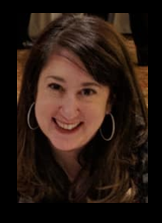 Cheryl Zaidan is a full-time marketer, part-time writer and hardcore dreamer who enjoys creating fictional characters just so she can do bad things to them. When did you know you wanted to become a writer? I'm a lover of words so I suppose it was inevitable. I've always enjoyed writing both fiction and non-fiction and have done quite a bit of freelance writing in the past. I have to admit, I used to love writing short stories, but for awhile my creativity was stalled. It wasn't until I decided to stop censoring my imagination and embrace the weird, that the words started to flow again. The main characters in your story are male. What's the most difficult thing about writing characters from the opposite sex? Oh boy, I love writing characters that are nothing like myself regardless of sex. It's so much fun to get into somebody else's head, embrace their mannerisms, their dialect etc. even if they ARE fictional. I also like a lot of diversity so whether they're male or female, they come from different places and all walks of life. Poor hapless Rufus who I wrote for this story was a blast to create, although the spellchecker didn't like his language sometimes. I still can't convince Microsoft Word that "ain't" is what I meant to write. What is the most difficult part of your creative process? Sitting down and actually doing it. I just started writing and submitting in earnest late last year and it's been fun, but it took longer than I'd like to admit to get a little serious about it. Also I only write when I feel like it and don't force myself when I don't. That goes against all the rules that tell you that writers must write everyday, but hey, my muse only works part-time. What is your current project and can you share a little of it with us? I'm working on a writing site/blog at www.CherylZWrites.com and I'm also planning on editing one of the many, many novels I've written during National Novel Writing Month. I'm a big proponent of that program. What do you like to do when you're not writing? Well, working. But also reading, yoga, watching horror movies, listening to music and bugging friends and family. What's next for Cheryl? Cheryl's next story is called "Ugly Eyes" and will be featured in the ezine "The Asylum Diaries – Autopsy."
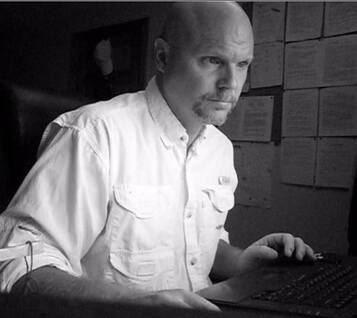 Rob Smales is the author of Echoes of Darkness, which garnered both a five-star Cemetery Dance Online review and a 2016 Pushcart nomination. With over two dozen short stories published, his story “Photo Finish” was also nominated for a Pushcart Prize and won the Preditors & Editors’ Readers Choice Award for Best Horror Short Story of 2012. His story “A Night at the Show” received honorable mention on Ellen Datlow’s list of the Best Horror of 2014, while “Death of the Boy” and “In Full Measure” made the same honorable mentions list for 2016. Most recently, he edited the dark humor anthology A Sharp Stick in the Eye (and other funny stories) for Books & Boos Press, and released the coming of age horror novella Friends in High Places with Bloodshot Books. When did you first begin writing stories? August 9, 2010. I know, because I still have the file. I wrote a single scene, just to see what it would be like. I eventually expanded that scene into a short story, a—if you can believe this—romantic comedy that no one will ever, ever see. But it did all start with a scene about a young man picking up a girl for a date, written just for myself, back in August of 2010. On your website, you state that you write character-driven dark fiction. Would you elaborate on that? Sure! I’m a pantser—or discovery writer if you’re feeling fancy—which basically means that when I sit down to write, almost nothing about the story’s set in stone. I have a starting point and a proposed ending, and I just start writing my way there. Along the way I meet my characters, become acquainted, and see them in action. Just like you get to know the people around you by observing what they say and do, I do the same with the people in my head. And just like it strikes you as odd if someone you know does something out of character—say your mom started snarfing down a Skippy on whole wheat sandwich, when you know she has a peanut allergy—it strikes me as odd if these new friends of mine start doing things that are out of character for them. If it strikes me as odd, it’ll strike my readers as odd, and that will give that temporary suspension of disbelief thing we fiction writers rely so heavily on a serious poke, and pull the readers out of the story. Take the mother in the above example: if someone told you she was eating that peanut butter sandwich, and you knew about her nut allergy, your first reaction is to say “I don’t believe it!” That’s the kind of reaction I’m trying to avoid. If it were her brother, however—and we all know he has a serious love for Skippy—it wouldn’t raise any eyebrows. What if someone had a gun to the brother’s head and told her he’d die if she didn’t eat that sandwich. Would she eat it then? Of course! That’s the way I write my stories. Along the way to the intended destination, everything that happens has to fit the characters involved. If none of the characters would do a thing that needs to happen in my story, I either have to change the circumstances so they would (the gun to his head above), or change the story itself to make it fit the characters. The story becomes driven by the in-character actions of those characters. Sometimes that means the ending can even change, a new one rising up propelled by the characters themselves. How did you get the idea for "Do I Fat?" I’m a mailman by day, and I have a lot of customers. I used to have a woman who received registered packages with stunning regularity, and whenever she did would give me a packet of cookies while signing the receipt. Eventually I told the cookie lady, “Please, you don’t have to do that. I’m going to get fat.” The cookie lady is an elderly emigrant from the former Soviet Union, and though her English is about a billion times better than my Serbo-Croatian, she looked up at me and said, in an accent worthy of Mr. Chekov, the original Star Trek helmsman, “But you walk all day. You walk, you sweat. You sweat, you lose weight. I work in bakery. Hard work. I sweat.” She raised spindly arms to showcase her spindlier body. “Do I fat?” I had to admit that she did not. But her little speech stuck with me—I love accents, and might easily listen to her tell stories for hours—and I’d recently read something that had reminded me of Baba Yaga, the witch of Russian folklore who appears in so many tales, though is best known around these parts as the child-munching cannibal in Hansel and Gretel. I started wondering what it would be like if Baba Yaga had survived to the modern age. Would she fit in? Would she still be up to her old kid-eating tricks? Would she, in fact, fat? Now we know. As a side note, a couple of months after having that little conversation, shortly after I’d written my first draft of “Do I Fat?”, the cookie lady took that day’s receipt into her apartment to sign and was gone for longer than usual. When she returned, she handed me the signed slip . . . and an apple. Apparently, I had been right all along, and I do fat. Do you have an essential book on the craft of writing that you would recommend to others? The only book on writing I’ve read is On Writing, by Stephen King. I read it because I love King’s work, and his style, and also because it was entertaining as hell, but I wouldn’t call it essential. Much of what he actually says about writing is more general than specific, more guidelines than rules—which might be a result of his basic belief that writing can be learned, but it can’t be taught. People come at this writing thing from so many different angles, no one book will work for everyone, and he’s pretty upfront about thinking that. I believe that as well, so to my way of thinking no book is essential. If you don’t like King or his style of storytelling, then it’s definitely not the book for you. If you do like King, then read it for fun, but don’t go into it assuming it will make you a better writer—though it may help. So, essential? No. Recommend? Sure, if you like him, pick up a copy of On Writing, because:
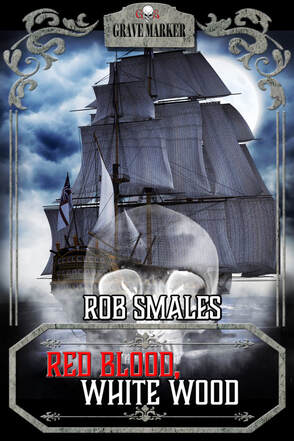 Who is your favorite author and what really strikes you about their work? I’ve mentioned loving King's work, but my favorite book of all time is A Prayer for Owen Meany, by John Irving, and I’ll tell you why. It’s the story of someone’s life—Owen Meany’s, of course—and is written that way, with lots of scenes and little stories that don’t really seem to have a goal, or even anything in common other than their having to do with the title character. That’s how we live: some stuff happened yesterday that has nothing to do with some of the stuff that’s happening today, and all of that really has nothing to do with some of the things that will happen tomorrow, other than that they’re part of our ongoing lives. Irving managed to write all these disparate parts in such a way that they’re all interesting, all fun, and you never sit there wondering Jesus Christ, where the hell’s he going with all this? Then you get to the end of the book, and all those loose threads he’s left lying all through the story, he starts pulling them tighter. He tugs on this scene, then that one, and your perception of them begins to shift—and then, like one of those optical illusion puzzles where if you look at a pattern just right it resolves into a picture, and instead of seeing just a random bunch of colored dots you’re suddenly looking at the face of Jesus, or Hendrix, or John Lennon, every scene that’s come before that used to seem unconnected sort of lines up and falls into place in your mind, and you see that everything--everything—that’s come before was actually all aimed toward this exact point in Owen’s story. You draw in a deep breath of wonder, and it comes out through rounded lips in a sigh that sounds suspiciously like “whoa . . .” I want to do that. Someday, I want to do that. Who is your greatest cheerleader? I have a few cheerleaders, each great in their own way, and it would be insulting and unfair to choose one above the rest. How’s that for a political answer? What's next for you? The next thing I have coming out is a small standalone not-quite-a-novella, the next installment in Grinning Skull Press's Grave Marker series, Red Blood, White Wood. This little pirate story is a tale of murder, mist, and magic, and will be available in the Kindle store on June 27 for just 99 cents.
You had us hooked with the notion of a 'Skunknado'. but the heroes of the tale really made the story. What inspired you to create them? When I was brainstorming for Strangely Funny VI, a coworker saw a skunk in the parking lot and thought it was a cat. When we got closer, we realized it wasn’t a cat, and we all laughed. I decided then that there is just something innately funny about skunks, because when they attack, you aren’t really injured, you just stink (which is somehow worse than being bitten), and that there needed to be at least one skunk in my next Strangely Funny submission. I’d watched a few disaster movies over the preceding month or so, including classics like Twister, and I liked the idea of writing a parody of disaster films. But with skunks. I’d never seen any of the Sharknado films, but I felt that they were now the industry standard for disaster movie parodies. I watched one, it was bad. Really bad. Really, really, gloriously bad. I wanted to write a parody of a parody, so it had to ratchet up the insanity exponentially. If Sharknado stretched the suspension of disbelief to the breaking point, my story would have to tear straight through it. Disaster movies have their own tropes, and their own highly specialized characters who are uniquely capable of coping with the extreme situations they find themselves in. For instance, in Twister you have Bill Paxton and Helen Hunt’s characters, seasoned storm chasers who work at the fringe of acceptable science. At least one character in a disaster movie has to be the lone-wolf outsider who correctly predicted the disaster was coming, but was ignored, or worse, mocked. Think of Jeff Goldblum’s character in Jurassic Park (which is both a disaster movie and a horror movie!) when he says “ ...your scientists were so preoccupied with whether or not they could that they didn't stop to think if they should” (which I quote in "Skunknado"). Then, of course, you need a group of otherwise capable characters to be put in a situation from which they need to be saved. One of the defining characteristics of a disaster film is that somebody, usually several somebodies, must be saved by the hero. It is this heroic salvation that drives the drama in the story. So, I needed a disaster. I took the insanity of Sharknado, and made it yet more insane by replacing the sharks with skunks. But that wasn’t bad enough, so I made the tornado the biggest one ever, sort of like the final tornado in Twister. Now, I needed someone to put into danger. I settled on a team of storm-chasing scientists who had a new laser-based technology that were studying tornadoes. I looked at the tropes and settled on the elderly academic who lets his mind wander, a uniquely rebellious graduate student who is fiercely intelligent, but has poor people skills, and an overweight guy who has memory lapses that require the other characters to explain what’s going on at inopportune moments. I threw them in a van, hurled a Skunknado at them and voila! You have a recipe for disaster.  Now, for the hero. Think of disaster movie heroes and you come up with a stereotype pretty quickly. Dwayne “The Rock” Johnson in San Andreas (or Rampage, Skyscraper, etc.), Bruce Willis in Armageddon, Thomas Jane in The Mist, and any film starring Arnold Schwarzenegger, all hyper-masculine and all hyper-capable heroes that few olympians could hope to match. I briefly considered making the hero of the story a female, but since "Skunknado" is a parody of the genre, I felt I needed a man to really sell the complete ridiculousness of the story. Enter Jack Dammett. Jack is a ruggedly handsome man, with four PhDs and a nice car. He’s the kind of guy that has theme music playing when he walks down the street, and has serious opinions about meteorology and the quality of his tan. I conceived of Jack as a kind of genetic hybrid of every action movie hero, combined with the brains of Steve Jobs and the laid back attitude of Matthew McConaughey. Everything he does is essentially effortless, yet undeniably cool. He got his name because I wanted to include the line, “Dammit, Dammett!” I really like the character, and I think Jack Dammett will return. Can you tell us a little about your writing process? I like to write in the evenings, or in the very early morning (a couple hours before the sun rises). I brew a pot of tea, usually a Darjeeling blend, and fire up some music. It needs to reflect the genre I’m writing. For instance, when I wrote my detective novel, Bigshots & Bulletholes, which is set in the 1940s, I listened to musicians like The Andrews Sisters and Bing Crosby, while some of my horror stories had Marilyn Manson or Skindred as the soundtrack. Honestly though, the playlist I use most is Bach’s Inventions, which I can listen to while writing almost anything. My stories are plot-driven, so at the start I decide the broad themes I want to explore, and then decide on a few must-have elements that must happen in the story, then I start to write. I don’t do any detailed plotting in advance of starting the story (which I’m told makes me a pantser), I prefer to let the story progress organically. Some writers consider this approach suboptimal because the plot can meander a bit if you’re not careful, but from what I’ve seen of the real world, meandering is an unavoidable consequence of living. I find great satisfaction when a plot unfolds in a story without my needing to bludgeon it to fit within a preconceived plot framework. It doesn’t always happen, but when it does, it’s narrative magic. If you could ask your readers one question, what would it be? What specific type of novel is an automatic “must buy” for you? Is there a new author or book out there that you think we should be reading and why? I just discovered Jo Nesbø not long ago, and I’m working my way through his backlist now. He’s not necessarily a “new” writer, but his work is new to me. Last year I did the same thing with Henning Mankell’s work. The specific genre that both authors fall into is Scandinavian noir, which is again, not new, but new to me. Give it a try, you won’t be disappointed. What is your current project? I’m writing another 1940s detective novel, a sequel to Bigshots & Bulletholes, featuring my female private eye, Kissy Lisbon. My progress has been slow for a couple of months because I’m still trying to adapt to my new work schedule at my day job (I work for Uncle Sam, but not in a bad way). I’ve spent the last fifteen years happily working third shift, but now I’m working seconds, and I’m having trouble sleeping during the night. Insomnia is not conducive to writing. I just wrote a script for the PLB Comics Halloween Special due out later this year. It’s an anthology title, my story will be one of several. My brother is doing the sequential art for my part of the book. I also have several short stories in various states of completeness, ranging from barebones ideas, to final polishing.
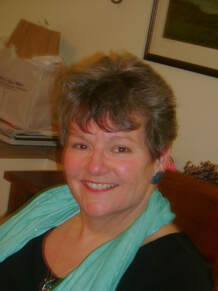 Beverly Alice Black is an immigration attorney in Philadelphia, Pennsylvania during the day and a fiction writer at night. Her short stories have been published by The Saturday Evening Post, Disturbed Digest and Enchanted Conversation. Follow her on Facebook at Attybeverlyblack and on Twitter @AuthorBevBlack. When did you know you wanted to become a writer? I want to be a writer? I thought it was just something I had to do. But seriously, as like most writers, I've written since childhood, created characters and backstories. But I really started writing when my children were little and I wrote for them. Can you tell us a little about your writing process? I start with a character. I get to know that character, create a very detailed backstory. From there I create the story, focusing on the most important day in that person's life. I try to keep the other characters to a minimum. Where did the inspiration for "Angel in Hell's Kitchen" come from? That's an easy one. I went to Mexico at 18 and two years later spent my junior year abroad in Costa Rica. When I was growing up, where I was growing up, an attractive female was a blonde with long legs, big boobs and no butt. I was just the opposite: dark haired, short and with a big butt.. When I went to Latin America the men not only showed attention to me but they actually thought I was pretty. Hot, even. I couldn't believe it. I thought they were just trying to trick me, but I soon realized that different cultures have different ideas about beauty and what makes a person attractive. This story is all about that. About a group accepting you for who you are and appreciating what you bring to the table. A lot of your writing is fact-based and serious. How different is it to write humor? Writing humor is hard! It is much easier to write a legal brief because you know what has to be written and in what order. Humor is subjective ... It's hard to hit the sweet spot between being illuminating and obnoxious. Your day job (immigration attorney) sounds pretty interesting. Tell us a little about it. Many people in my critique group think I should write about immigration and immigrants. I have written a few stories, but I live this every day. My clients' stories are tragic. Many of my clients from Central America have lost loved ones and still don't qualify for asylum because they don't fit into rubric we've created about who deserves asylum. I don't feel qualified to write as a Latina because i'm not, even though my daughters are and I've spent a lot of time in Latin America.. I think Latinos should tell their own stories. Is there a new author or book out there that you think we should be reading, and why? Definitely. John Schoffstall's book The Half Witch came out last year and has bee nominated for a ton of awards. He's probably the most imaginative writer I know. if you haven't' read his work, you should. His imagination is amazing.
|
Welcome!
Mystery and Horror, LLC, is an indie press interested in what the name suggests. Contact us at: [email protected]
Archives
October 2023
Categories
All
|
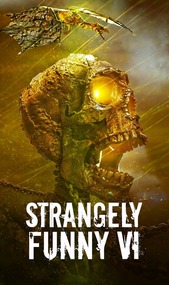
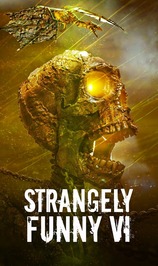
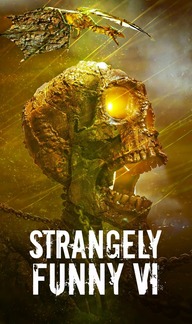
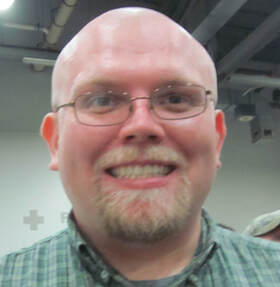
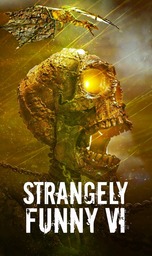
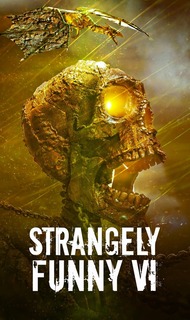
 RSS Feed
RSS Feed